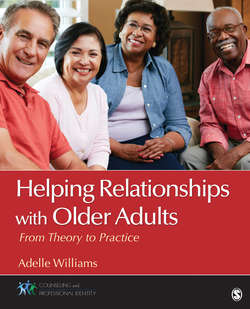Читать книгу Helping Relationships With Older Adults - Adelle M. Williams - Страница 59
На сайте Литреса книга снята с продажи.
Challenges Facing Baby Boomers
ОглавлениеA few of the challenges facing the baby boomers are similar to those facing the entire United States. Due to various events, the bulk of the boomers’ retirement savings and investments have dwindled. This has resulted in a decision for some to continue to work past traditional retirement age. However, for others, businesses and other institutions give incentives to their highest paid employees to retire or resign—or ultimately force them to do so. The vacancies created by these forced retirements or resignations are often not filled and the responsibilities of the individuals, who held those jobs are assumed by younger, lower paid employees. This action is causing older adults to seek counseling for problems and concerns related to stress at work (Vaillant, 2003).
Personnel policies that push older workers out of the skilled positions will be re-examined by human resource professionals and organizations in the future. In some segments of the workforce, the cost of replacing experienced older workers could exceed the increased expenses of retaining them. Therefore, rather than encouraging boomers to retire, tax and pension policies may need to be revised, as well as Social Security and Medicare programs to encourage boomers to remain engaged and productive citizens (Goldsmith, 2008).
Problems can arise in the workplace when generations collide (Lancaster & Stillman, 2003). Employee productivity remains the key to success and that means ensuring the productivity of workers both young and old. Understanding multigenerational differences in the workplace will be a major factor in organizational life as aging boomers remain longer on the job. For example, working collaboratively might pose challenges for younger age cohorts as they attempt to work with older adults. Johnson and Johnson (2010) have offered practical suggestions regarding how younger workers can respond to aging baby boomers, such as “Don’t ignore older workers” and “Don’t give up on them.” In other words, age-related stereotypes should be avoided. Younger workers are also encouraged to ask older workers to make continuing contributions, for example, by becoming mentors to young people. Complete Guided Practice Exercise 2.4 to better understand the characteristics and viewpoints of the baby boomer generation.
Guided Practice Exercise 2.4
Baby boomers were born between 1946 and 1964 and represent a very distinct cohort. What are some of the characteristics of this cohort? How do you think the baby boomers view the aging process? What are your views regarding baby boomers working for longer periods of time (well past 65 years of age)? Interview a person born between 1946 and 1964. Ask questions that will provide data to help you understand this age cohort. Ask questions regarding employment, retirement, cross-cultural experiences, sexuality/intimacy, living arrangements, health, family relationships, and their most significant accomplishment(s). Share this information with your peers and colleagues.
Older workers can show strong productivity because of greater life experience, but their skills may be outdated. Though they are likely to have lower rates of absenteeism, they may have more health problems than younger persons. A key to productivity over the life span will be whether employers can build on the positive attributes of older workers, while also providing training to ensure that their skills and knowledge remain up to date (Moody & Sasser, 2012). Attributes of older workers such as experience, reliability, work ethic, and loyalty are valued; however, some employers have doubts about older boomers’ creativity, flexibility, and willingness to learn new things (Mermin, Johnson, & Toder, 2008). The baby boomer generation may seek counseling to address the challenges posed by delayed retirement, incentives to retire, remaining in the workforce, or reentry into the workplace.
Guided Practice Exercise 2.5 provides the opportunity to explore benefits and challenges that older workers perceive within the workplace and examine available mental health services and the extent to which these services are utilized.
Guided Practice Exercise 2.5
In this exercise, you will develop a personal list of the benefits and challenges (stressors) associated with work. Informally sample 10 older workers and ask them to create their own list of benefits and challenges. You will then compare the lists and identify areas that pose challenges for older workers. Next, you will explore services available within the work environment and mental health services available in the community to address workplace stressors. Finally, you will examine barriers that impede utilization of these services and develop strategies to minimize the impediments.
Mental health counselors are to use their knowledge of the baby boomer generation to increase their understanding of these older clients. Mental health professionals need to be well-versed in the aging process, leisure activities, career paths for nontraditional clients, loss and grief, retirement issues, financial planning, health insurance, health concerns, and environmental issues. These professionals are required to be advocates for their older clients and change agents. Mental health counselors will be in a position to provide better counseling services to older clients due to their enhanced appreciation for older adults’ unique characteristics.
Work remains important to many older clients, which poses an opportunity for the mental health counselor to address issues that promote and/or impede participation in the labor force. Mental health counselors will also become a resource to connect their older clients with services in the community to assist with financial planning, obtaining insurance, and projecting lifestyle changes. The baby boomer generation will need mental health counselors to assist with emotional issues experienced as a result of continued employment, anxiety regarding retirement, uneasiness surrounding unanticipated expenses, and other issues that accompany major life transitions. Career counseling with older clients will become an integral component of the counseling process.
